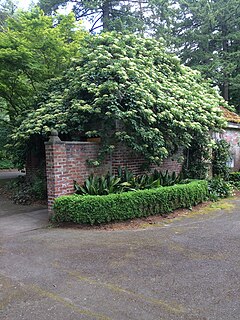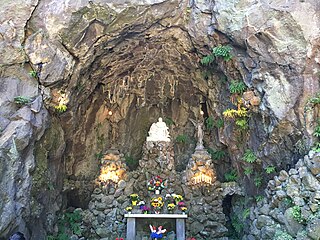See also
| | This disambiguation page lists articles associated with the title Portland Rose. If an internal link led you here, you may wish to change the link to point directly to the intended article. |
A Portland Rose is a type of garden rose.
Portland Rose or Portland Roses may also refer to:
| | This disambiguation page lists articles associated with the title Portland Rose. If an internal link led you here, you may wish to change the link to point directly to the intended article. |

Portland is the largest and most populous city in the U.S. state of Oregon and the seat of Multnomah County. It is a major port in the Willamette Valley region of the Pacific Northwest, at the confluence of the Willamette and Columbia rivers in Northwestern Oregon. As of 2019, Portland had an estimated population of 654,741, making it the 26th most populated city in the United States, the sixth-most populous on the West Coast, and the second-most populous in the Pacific Northwest after Seattle. Approximately 2.4 million people live in the Portland metropolitan statistical area (MSA), making it the 25th most populous in the United States. Its combined statistical area (CSA) ranks 19th-largest with a population of around 3.2 million. Approximately 60% of Oregon's population resides within the Portland metropolitan area.

Moda Center, formerly known as the Rose Garden, is the primary indoor sports arena in Portland, Oregon, United States. It is used for basketball, ice hockey, rodeos, circuses, conventions, ice shows, concerts, and dramatic productions. The arena has a capacity of 19,393 spectators when configured for basketball. It is equipped with state-of-the-art acoustics and other amenities.
Rose Garden may refer to:

The International Rose Test Garden is a rose garden in Washington Park in Portland, Oregon, United States. There are over 10,000 rose bushes of approximately 650 varieties. The roses bloom from April through October with the peak coming in June, depending on the weather. New rose cultivars are continually sent to the garden from many parts of the world and are evaluated on several characteristics, including disease resistance, bloom formation, color, and fragrance. It is the oldest continuously operating public rose test garden in the United States and exemplifies Portland's nickname, "City of Roses". The garden draws an estimated 700,000 visitors annually.

The Pittock Mansion is a French Renaissance-style château in the West Hills of Portland, Oregon, United States. The mansion was originally built in 1914 as a private home for London-born Oregonian publisher Henry Pittock and his wife, Georgiana Burton Pittock. It is a 46-room estate built of Tenino Sandstone situated on 46 acres (19 ha) that is now owned by the city's Bureau of Parks and Recreation and open for touring.

The Veterans Memorial Coliseum is an indoor arena located in the oldest part of the Rose Quarter area in Portland, Oregon. The arena is the home of the Portland Winterhawks, a major junior ice hockey team, and was the original home of the Portland Trail Blazers of the National Basketball Association. It has been included on the National Register of Historic Places in recognition of its architectural significance.

The Portland Rose Festival is an annual civic festival held during the month of June in Portland, Oregon. It is organized by the volunteer non-profit Portland Rose Festival Association with the purpose of promoting the Portland region. It includes three separate parades, along with a number of other activities.

Ladd's Addition is an inner southeast historic district of Portland, Oregon, United States. It is Portland's oldest planned residential development, and one of the oldest in the western United States. The district is known in Portland for a diagonal street pattern, which is at odds with the rectilinear grid of the surrounding area. Roughly eight blocks (east-west) by ten blocks (north-south) in size, Ladd's is bordered by SE Hawthorne, Division, 12th, and 20th streets. It is part of the Hosford-Abernethy neighborhood association.

The National Sanctuary of our Sorrowful Mother, popularly known as The Grotto, is a Catholic outdoor shrine and sanctuary located in the Madison South district of Portland, Oregon, United States. Constructed in 1924, the sanctuary covers 62 acres (25 ha), set both at the foot of, and atop, a 110 foot (34 m) cliff. It is a ministry of the Servite Friars, Order of Friar Servants of Mary. A large meditation hall whose main chamber is at clifftop level extends down to the foot of the cliff; the cross on the hill is visible many miles away. In addition to a church, there are several thousand feet of trails, including a trail of the Stations of the Cross, along which visitors may pass in contemplation through botanical gardens. The Grotto also features a full-service Conference Center, and a Gift Shop.

Tourism in Portland, Oregon is a profitable industry that serves many. In 2018, Portland area tourism generated $5.3 billion in direct spending by 8.6 million overnight person-trips and employs 36,360 people who were paid $1.5 billion.

Washington Park is a public urban park in Portland in the U.S. state of Oregon. It includes a zoo, forestry museum, arboretum, children's museum, rose garden, Japanese garden, amphitheatre, memorials, archery range, tennis courts, soccer field, picnic areas, playgrounds, public art and many acres of wild forest with miles of trails.

The Washington Park & Zoo Railway (WP&ZRy) is a 2 ft 6 in narrow gauge recreational railroad in Portland, Oregon's Washington Park with rolling stock built to 5/8 scale. Opened in three stages in 1958, 1959 and 1960, it provided transportation between the Oregon Zoo, Hoyt Arboretum, International Rose Test Garden, and the World Forestry Center. The extended line was about 2 miles (3.2 km) long. The service is currently operating on a 1-mile (1.6 km) loop within the zoo grounds. The railway carries about 350,000 passengers per year.

The Waterfront Blues Festival is an annual event in Portland, Oregon, United States featuring four days of performances by blues musicians. The festival started in 1988 and takes place in Tom McCall Waterfront Park, along the west bank of the Willamette River in downtown Portland.

Peninsula Park is a public park in the Piedmont neighborhood of Portland, Oregon, United States. The 16.27-acre (6.58 ha) park is located in the North Portland neighborhood and contains an outdoor swimming pool, community center, baseball fields, playgrounds, basketball courts, tennis courts, covered picnic areas, a historic gazebo and other amenities. In 2007, area residents started to propose a piece of public art be added to the park honoring Rosa Parks, as the park lies along Rosa Parks Way.

The city of Portland, Oregon is ideal for growing roses outdoors due to its location within the marine west coast climate region, its warm, dry summers and rainy but mild winters, and its heavy clay soils. Portland has been known as the City of Roses, or Rose City, since 1888, after Madame Caroline Testout, a large pink variety of hybrid tea rose bred in France, was introduced to the city. Thousands of rose bushes were planted, eventually lining 20 miles (32 km) of Portland's streets in preparation for the Lewis and Clark Centennial Exposition in 1905.
The following is a timeline of the history of the city of Portland, Oregon, United States.
There are several well-known and commonly used nicknames referring to Portland, Oregon.
Portland most commonly refers to:

The Frank E. Beach Memorial Fountain, officially titled Water Sculpture, is an abstract 1975 stainless steel fountain and sculpture by artist Lee Kelly and architect James Howell, installed in Washington Park's International Rose Test Garden in Portland, Oregon. The memorial commemorates Frank E. Beach, who christened Portland the "City of Roses" and proposed the Rose Festival. It was commissioned by the Beach family and cost approximately $15,000. Previously administered by the Metropolitan Arts Commission, the work is now part of the City of Portland and Multnomah County Public Art Collection courtesy of the Regional Arts & Culture Council.

Georgiana Burton Pittock, was an Oregon pioneer and community leader based in Portland, Oregon. She founded the Portland Rose Society in 1888. The society's annual rose show grew into a rose parade and pageant by 1906, and was the foundation for the Portland Rose Festival. Pittock was actively involved in charities and cultural organizations in Portland from the 1870s through the early 1900s.